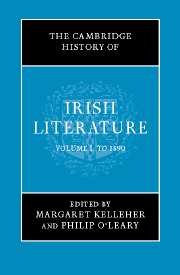Book contents
- Frontmatter
- Introduction
- 1 The literature of medieval Ireland to c. 800: St Patrick to the Vikings
- 2 The literature of medieval Ireland, 800–1200: from the Vikings to the Normans
- 3 The literature of later medieval Ireland, 1200–1600: from the Normans to the Tudors
- 4 Literature in English, 1550–1690: from the Elizabethan settlement to the Battle of the Boyne
- 5 Literature in Irish, c.1550–1690: from the Elizabethan settlement to the Battle of the Boyne
- 6 Prose in English, 1690–1800: from the Williamite wars to the Act of Union
- 7 Poetry in English, 1690–1800: from the Williamite wars to the Act of Union
- 8 Literature in Irish, 1690–1800: from the Williamite wars to the Act of Union
- 9 Theatre in Ireland, 1690–1800: from the Williamite wars to the Act of Union
- 10 Irish Romanticism, 1800–1830
- 11 Prose writing and drama in English, 1830–1890: from Catholic emancipation to the fall of Parnell
- 12 Poetry in English, 1830–1890: from Catholic emancipation to the fall of Parnell
- 13 Literature in Irish, 1800–1890: from the Act of Union to the Gaelic League
- 14 Historical writings, 1690–1890
- 15 Literature and the oral tradition
- Guide to major subject areas
- Index
- References
6 - Prose in English, 1690–1800: from the Williamite wars to the Act of Union
Published online by Cambridge University Press: 28 March 2008
- Frontmatter
- Introduction
- 1 The literature of medieval Ireland to c. 800: St Patrick to the Vikings
- 2 The literature of medieval Ireland, 800–1200: from the Vikings to the Normans
- 3 The literature of later medieval Ireland, 1200–1600: from the Normans to the Tudors
- 4 Literature in English, 1550–1690: from the Elizabethan settlement to the Battle of the Boyne
- 5 Literature in Irish, c.1550–1690: from the Elizabethan settlement to the Battle of the Boyne
- 6 Prose in English, 1690–1800: from the Williamite wars to the Act of Union
- 7 Poetry in English, 1690–1800: from the Williamite wars to the Act of Union
- 8 Literature in Irish, 1690–1800: from the Williamite wars to the Act of Union
- 9 Theatre in Ireland, 1690–1800: from the Williamite wars to the Act of Union
- 10 Irish Romanticism, 1800–1830
- 11 Prose writing and drama in English, 1830–1890: from Catholic emancipation to the fall of Parnell
- 12 Poetry in English, 1830–1890: from Catholic emancipation to the fall of Parnell
- 13 Literature in Irish, 1800–1890: from the Act of Union to the Gaelic League
- 14 Historical writings, 1690–1890
- 15 Literature and the oral tradition
- Guide to major subject areas
- Index
- References
Summary
The defeat of the Jacobite forces in 1691, confirmed by the Treaty of Limerick, was soon followed by varied attempts by the Protestant (and particularly Anglican) minority in Ireland to justify their position of dominance over the country’s Roman Catholic majority, at times in defiance of the terms of the treaty. This they did by appeal to Providence, by the assertion of the Irish parliament’s legislative independence of the parliament in London, and by means of penal legislation directed against the economic interests as well as the political, religious, and educational freedoms of Catholics. Though working in a cultural context marked by an uneasy admixture of self-confidence and defensiveness, Protestant writers of varying beliefs produced literary work – political, philosophical, theological, economic and scientific – of remarkable assurance for an audience that extended, at times, far beyond those like themselves, to include pre-eminent figures in Great Britain, continental Europe and North America.
Enlightenment and Counter Enlightenment, 1690–1750
Attempts to legitimise Protestant ascendancy in Ireland began early. In his State of the Protestants of Ireland under the late King James’s Government (1691), the Trinity College, Dublin-educated William King (1650–1729), archbishop of Dublin from 1703, gave a damning account of the oppression suffered by Protestants during the earl of Tyrconnel’s Roman Catholic administration in the late 1680s. Attributing the triumph of Protestantism to divine providence, King offered a justification of the change of allegiance from James II to William and Mary, but he was not himself notably hostile to Roman Catholicism, later voting against a great part of the penal legislation.
- Type
- Chapter
- Information
- The Cambridge History of Irish Literature , pp. 232 - 281Publisher: Cambridge University PressPrint publication year: 2006



